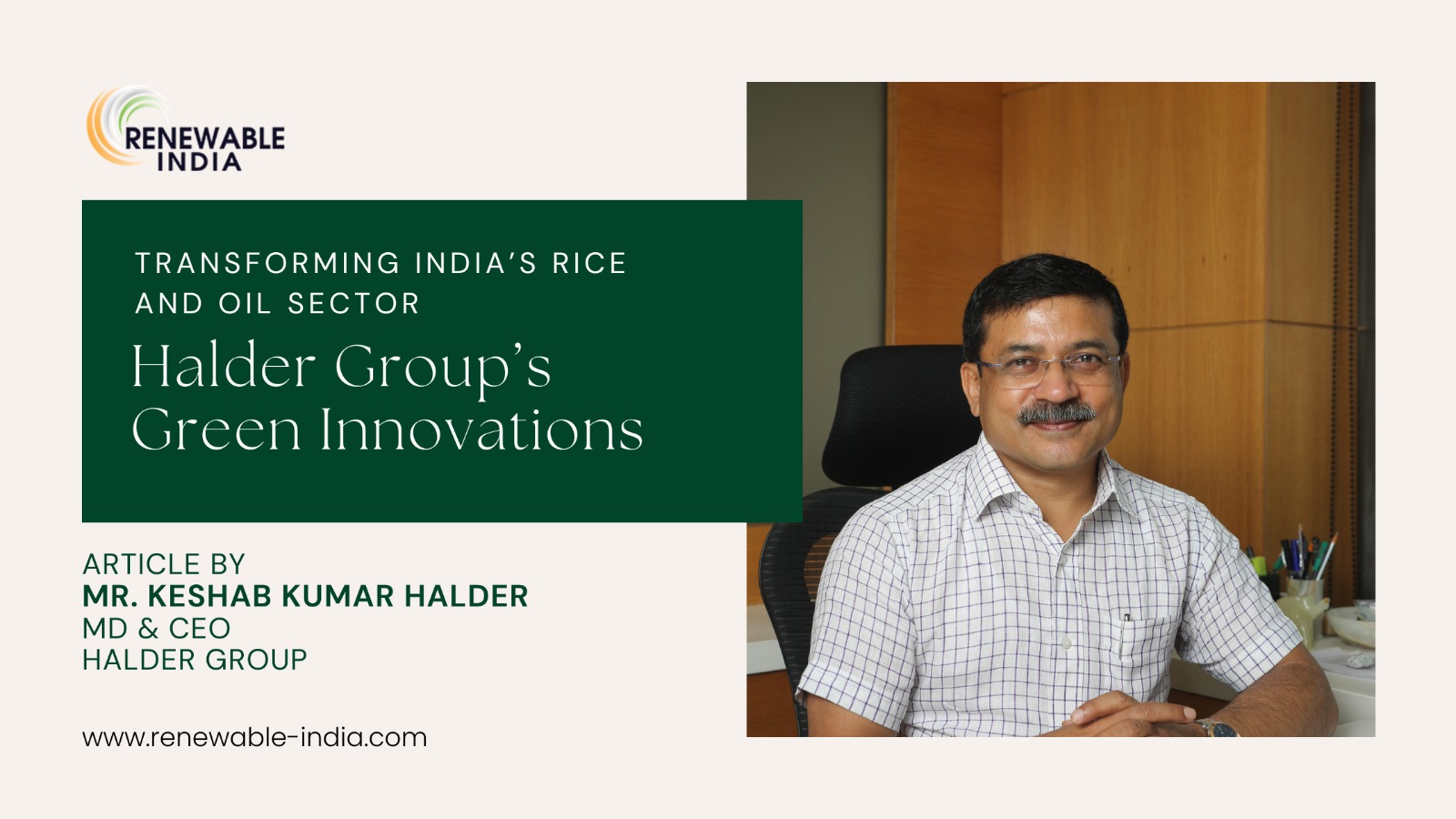
2nd September, 2024: In the heart of the rice export trade, India stands tall as the largest exporter of rice, which is the crucial staple food globally. Sustainability is a significant issue in the rice sector in India due to its widespread production and consumption. The livelihoods of millions of people depend on the production of rice and edible oil in our country, which has also boosted the economic growth. Starting from cultivation right to the production of rice and edible oil, both of them involve high usage of water and energy. It is very crucial to conserve such resources to guarantee adequate production and satisfy the market needs, as well as reduce the effects on the environment.
Halder Group, a leading name in the rice and oil manufacturing sector, originated from West Bengal, which is the largest rice producing state in India, and has emerged as a pivotal contributor to the nation’s economic development. Last year, Halder Group strategically expanded to Ghana, Benin, Togo, and Cameroon, alongside its existing international markets. Beside the company’s growth trajectory, Halder Group is also committed to the principles of sustainable manufacturing, adopting new technologies and practices to minimise the impact on the environment and improve performance.
The company has been actively implementing sustainable practices, environmental protection, and energy saving measures in the production units, which are recognized as the best practices in the manufacturing sector. Some of the recent sustainable strategies implemented by the company, such as installing Programmable Logic Controllers (PLCs) for energy saving, incorporating air pollution removal systems, installing Effluent Treatment Plants (ETPs) for cleaning and treating wastewater, and most importantly, ensuring “Zero Waste Policy”. The company’s mission is to set an example of how innovation and environmental responsibility are not only valuable but also mandatory for future generations through these practices.
Production units require a huge amount of energy to operate. PLCs have been installed in Halder Group’s new rice plant to enhance the efficiency of the plant and cut down on energy usage sharply. PLCs control the speed of the motors and equipment with the help of Variable Speed Drives (VSDs) depending upon the requirement of production, and thus the energy savings are up to 4.4% to 6%. Operations are actively planned during low usage periods to contribute to energy conservation, which is in line with the company’s policy on environmentally friendly production. This modern approach is much different from the old rice milling technology, which comparatively saves more energy and highlights the company’s commitment to environmental concerns using the advanced technology.
Due to air pollution, Halder Group has incorporated an air pollution removal system that is installed before its chimneys. During rice processing, husk is burned in boilers to produce steam and hot water, which emits smoke containing impurities such as silica and carbon particles. This mechanical air filtering system used in the company is made of several stages that include Air Preheaters (APH) and cyclomax combustion to remove the substances in the air. This helps to ensure that the air released into the environment meets necessary purity standards, reducing their effects on the environment and protecting the local air quality.
Since water is a key input in the operations of Halder Group, the firm has put in place sound water treatment mechanisms in its edible oil and rice mills. The company utilizes above 1200 kilolitres of water daily in the rice mills, solvent extraction, and chemical refinery of edible oil combined. All of this water is recycled, with 20% to 30% being reused, and the remainder released into nearby farms for irrigation. The Halder Group has installed ETPs, which are also responsible for cleaning wastewater by cooling, filtering, neutralising, and sedimenting to make the water safe to be reused or discharged. This initiative promotes sustainable agriculture practices and reduces water pollution, thus underlining the company’s environmental policy.
Halder Group adheres to a comprehensive “zero wastage” policy, ensuring every output from rice processing serves as a by-product. Some of the important byproducts of the rice are rice husk, rice bran, and broken rice. Rice husk is used as a very rich source of fuel with a calorific value comparable to that of coal. Rice husk ash generated from the burning of rice husk in boilers contributes to manufacturing building materials. It is produced by the combustion of rice husk in boilers and helps to manufacture building materials. Rice bran is also one of the main byproducts in the process of rice milling, which is used both in animal feeding and in culinary products. Broken rice is used in a variety of culinary and industrial purposes, as well as for ethanol generation. Rejection rice, which is left over from processing immature paddy grains, contributes to livestock nutrition. This all-encompassing strategy reduces waste production, encourages resource efficiency, and strengthens the business’s dedication to sustainability across its operations.
Sustainability is also met through innovative flooring solutions in Halder Group. Thus, it can be seen that marble flooring in production units reduces wastage of raw materials and bacterial presence as compared to cement floors. Cleaning is also facilitated by the non-porous nature of marble, while the food safety standards are met by the hygienically appropriate surface. Besides reducing raw material wastage, enhancing resource utilization, and promoting a clean environment, this investment in cleanliness also benefits sustainability efforts.
A sustainable approach to rice production is thus becoming even more vital in tandem with the growing population, limitation of fertile land, and insufficient natural resources. Achieving self-sufficiency in rice production towards food security has significant consequences for a stable supply of rice. By embracing these sustainable practices, one can contribute to global food security, preserve the environment, and safeguard their own livelihoods. The journey towards sustainable rice production is not only a responsibility but a path towards a brighter and more secure future for all.
Leave a Reply